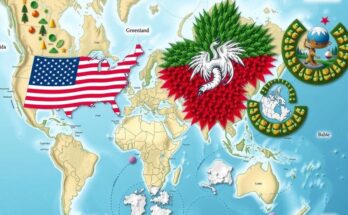President Kais Saied is poised for an overwhelming victory in Tunisia’s upcoming election, with the political environment devoid of competition due to the imprisonment and disqualification of opposition candidates. Many Tunisians express skepticism regarding their democracy, highlighting a regression into autocracy since the Arab Spring.
In Tunisia, the atmosphere surrounding the upcoming presidential election reveals a lack of excitement and low hopes among the populace. President Kais Saied, who has methodically consolidated power and oppressed dissent, appears assured of his triumph in Sunday’s election. The environment is starkly devoid of candidate promotion, debates, or any display of suspense. Notably, his main opponent is currently incarcerated, serving a lengthy prison sentence on charges deemed by his legal team to be fabricated. Moreover, a multitude of other potential candidates face similar fates, either imprisoned or under house arrest, with several disqualified altogether from participating in the electoral process. Despite the historical significance of the 2011 protests that propelled Tunisia towards a nascent democratic state — a beacon of hope after the Arab Spring — the current political landscape suggests a deep-seated disillusionment among Tunisians regarding their democratic prospects. Many now view the regime’s ongoing suppression of dissent as indicative of a one-man rule firmly entrenched in place. “He is willing to do anything it takes to stay in power — dividing Tunisians, prosecuting them, accusing them,” articulated Souhaib Fercheche, a senior campaigner at I Watch, a civic oversight group originating from Tunisia’s revolutionary movements. Despite Tunisia’s initial promise following the ousting of long-term autocrat Zine El-Abidine Ben Ali, aspirations for meaningful governmental improvement and personal freedoms remain unfulfilled, leading many citizens to question the very viability of democracy in their country.
The political situation in Tunisia has deteriorated significantly since the uplifting days of the Arab Spring, which, in 2011, led to the toppling of dictator Zine El-Abidine Ben Ali. This event sparked a wave of revolts across the Middle East, positioning Tunisia as a potential model for democracy. However, under President Kais Saied’s administration, the country has seen a regress towards autocracy. Saied has systematically silenced opposition, rendering the upcoming election a mere formality. This shift has caused widespread disillusionment among the populace, who now regard the electoral process with skepticism, believing it lacks legitimacy due to widespread imprisonment and disqualification of opposition figures.
In summary, as Tunisia prepares for its presidential election, the prevailing sentiment among citizens is one of apathy and disillusionment. President Kais Saied’s undisputed hold on power, evidenced by the imprisonment of political opponents and the repression of dissent, has all but erased the initial hopes for democracy that followed the 2011 revolution. This bleak electoral climate raises concerns regarding the future of political freedom in Tunisia, reflecting a disheartening shift from the aspirations that once fueled the Arab Spring movements.
Original Source: www.nytimes.com




